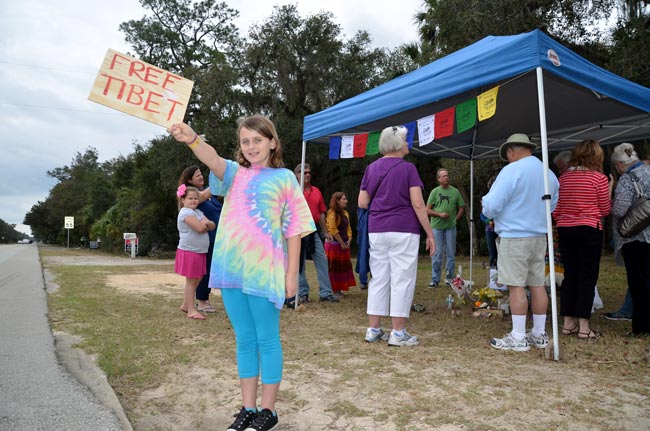
Last Updated: 7:39 p.m.
It was a year ago–on Valentine’s Day, to be precise–that Jigme Norbu, the 45-year-old nephew of the Dalai Lama, was struck and killed by a motorist as he walked on a dark stretch of State Road A1A on the first day of what was to be one of his epic walks for peace: he’d set off that morning from St. Augustine on what he called “Walk for Tibet Florida,” a 300-mile walk to West Palm Beach. It was his 20th walk around the world, and somewhere near his 8,000th mile on foot.
His walking partner that February day a year ago, Wangchuk Dorjee, a 67-year-old former Tibetan member of parliament, had stopped walking early and been driven ahead to J.T.’s Seafood Shack, where Norbu was to meet his support group. He was killed near the Palm Coast water tower.
This afternoon, a group of about two dozen people gathered at the site, under a temporary blue tent draped in Free Tibet flags, to commemorate the one-year mark of Norbu’s death.
“Obviously we’ve realized that human freedoms and rights are why we’re here,” said Damian Collins, co-owner of the Hammock Wine and Cheese Shop and one of the organizers of today’s event. “Free Tibet has been a long struggle and there’s a government waiting to step in, and it’s a hard struggle, and there are other people going through what ambassadorsforpeace.org is going through, like the Syrians. So my hope is that other people in other cultures and societies can soon know the freedoms we sometimes take for granted.”
After the candles and the incense were lit and the group gathered in a circle around the enduring makeshift memorial to Norbu–which has weathered storms, wind, heat, humidity and, not a small irony, the constant whip of traffic on A1A–Dorjee thanked everyone on behlaf of the Norbu family and the people of Tibet. And he reminded them that since February 2009, 22 Tibetans have immolated themselves, nine of them this year alone, and the last one just yesterday (Feb. 17).
The 6 million people of Tibet are involuntarily under the rule of China, and have been so for half a century. Protest has increased recently. “The Chinese government has sealed off a number of counties in the region and intensified security in an attempt to curtail the largest outbreak of unrest among ethnic Tibetans since the 2008 riots in Tibet’s capital, Lhasa, and elsewhere,” The Times reported on Feb. 5.
Dorjee described Norbu as a freedom fighter, “and unfortunately the Tibetans lost their freedom fighter.”
Several children were among the people who’d turned up, including a 9-year-old girl who chose to be at the commemoration rather than at a birthday party: she insisted that her mother bring her there. Donna Kim-Brand, a close friend of Norbu’s who had organized his Florida walk and who continues to be involved with Norbu’s family and the shepherding of Norbu’s memory, recognized the children’s presence, “because you are the ones who will be raised up to use your voices, to take steps forward as Jigme did on his walks and those of us who walked with him step by step,” she said.
Kim-Brand read from an Illinois third-grade classroom’s declaration to the United Nations General Assembly: “We the children of the world are asking the adults to listen. We think that you need us to help you find peace in yourselves. If you start from the heart, peace can spread to other adults and it will get bigger. We ask you to forgive and be kind to one another, We are asking you to be respectful and to treat others the way you want to be treated. We want you to try a different way to solve problems. If everybody thought fighting was the only way, then the whole world would be at war. If you don’t give peace to others then they won’t give it to you.”
Jamie DeFrates’s “Winterhawk”[media id=264 width=250 height=250]
A monk then prayed in rhythmic incantations accompanied by the occasional ringing of the bell–and the constant swish of traffic behind him. Jamie DeFrates, the singer (who, with his companion Susan Brown, had driven Norbu’s support group back to St. Augustine the night he died) did what has become a standard part of every ceremony at the site of Norbu’s last moment, singing “Winterhawk” (“You can’t impose your will/When the sun catches its eye/You can love it all you want/But you have to let it fly… You canl;t hold it to the ground/When there’s blue blue sky”).
The year since Norbu’s death, Kim-Brands said, has been “an amazing unforidng of events amongst the people who’d been involved–a lot of little mini-miracles, everything from births to finding new partners to finding new jobs, and everyone has continued as a mouthpiece” for the cause. Kim-Brands visited Norbu’s family in Indiana in April. He was the father of three, and a restaurateur in Bloomington (where he owned and ran the Snow Lion Tibetan restaurant on Grant Street)
“The family is taking longer than we might have thought, but everything takes its own time,” Kim-Brands said. Nurbu’s wife, Yaling Huang Norbu, is preparing to take over the Ambassadors for World Peace movement that Norbu had fostered, while Kim-Brands herself is writing a book about self-leadership designed to help Norbu’s boys grow up “as leaders themselves in case they’re put in the position, as they probably will, to take over the mantle ffrom their grandfather first, and then their father.” Norbu’s father, Thubten Norbu, had also been deeply involved in Tibetan activism.
Last June Norbu’s wife and his mother, Kunyang Norbu, along with the three boys, were in West Palm Beach for a ceremony involving the younger Norbu’s ashes. In May a world peace summit was held in New Jersey, with the Dalai Lama.
Kim-Brands has exploring her own new avenues. “I see my strength more in the leadership concept,” she said, “so I’m actually incubating thoughts of what I’m calling liberation leadership. It’s all about how you free yourself as a human, so it’s not just tinkering at the edges of a political system. Ultimately the way Tibet will become free I think, there has to be a tipping of critical mass of consciousness, even on the part of Tibetans, but people outside of Tibet, and the Chinese themselves.”
But Norbu’s message had been clear: “The Chinese people are not the enemy.” His whole view was “step-by-step world peace,” Kim-Brands said. “That’s why we had the groundswell reaction to we did his death. He was not just some lone wolf, even though it felt like that for us out here on the road. But when you look at the reaction, the global reaction after he died, oh, my God. It was to me the equivalent–I was in England when Princess Diana died, it was the equivalent to that. The groundswell: people didn’t even know that they had been so affected until it happened.”
![]()
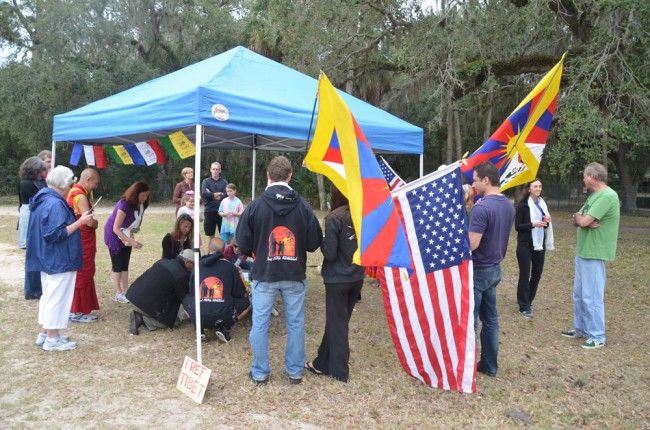
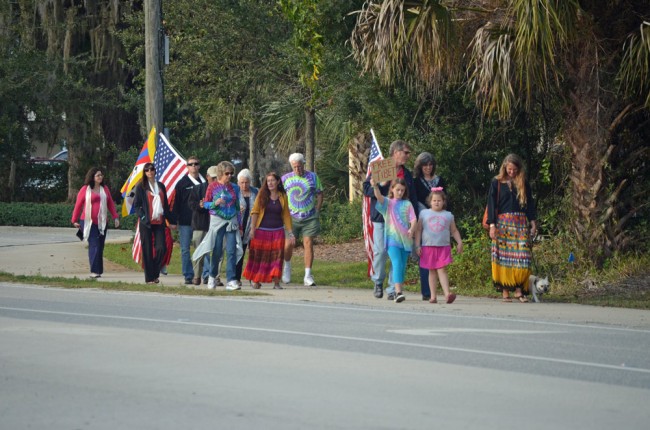
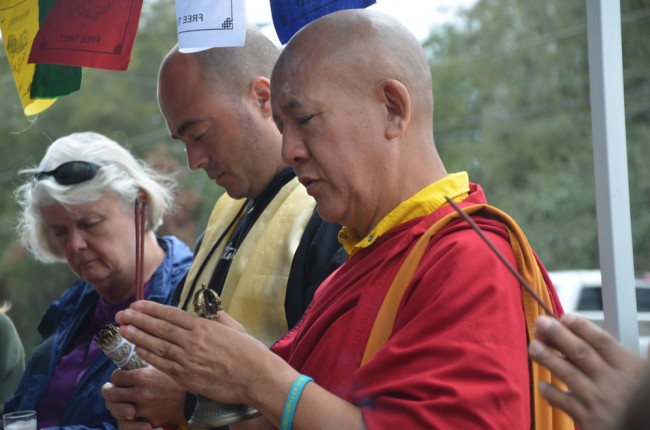
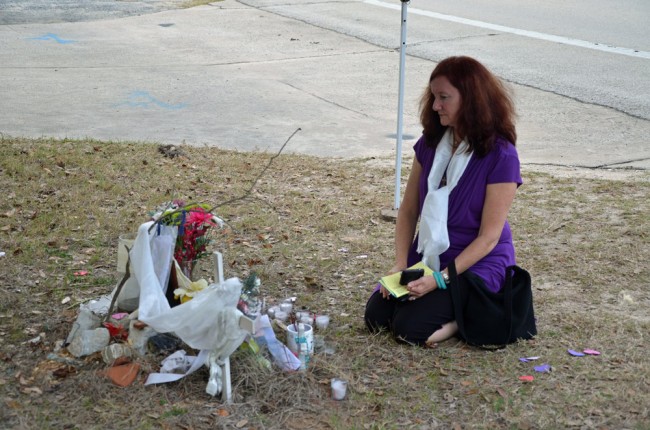
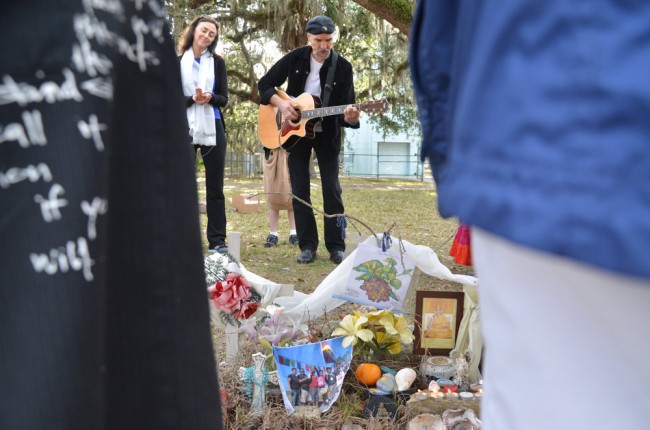
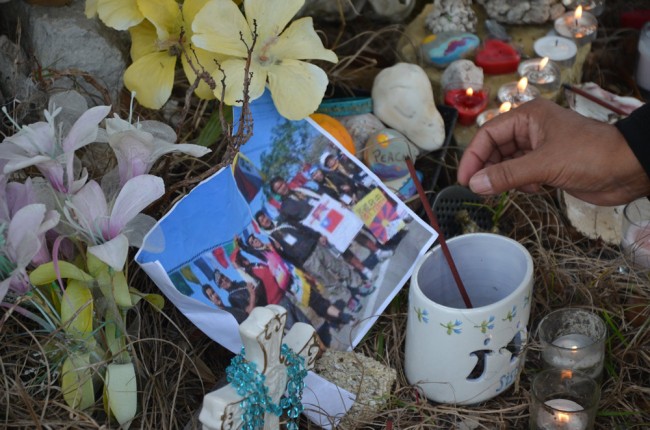
Watch and Listen to Jigme Norbu at the end of a 600-mile walk from Minnesota to Indianapolis:





























Leave a Reply